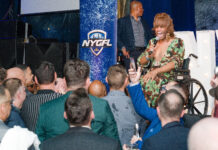In a world filled with divisions and differences, James Biller, a luminary in the realm of lighting design, invites us to consider a unifying metaphor: the disco ball. Beyond its glitzy reflections on the dance floor, Biller sees the disco ball as a profound symbol that mirrors the complexities of our lives and the shared experience of inhabiting the same spherical planet.
Biller, known for orchestrating a Space Disco event in 2021 featuring a solar system of disco balls and illuminating the largest disco ball at Bonnaroo Music Festival 2022, has spent a considerable amount of time surrounded by these glittering spheres. However, his fascination goes beyond the dazzling play of light. It delves into the realms of physics, philosophy, and the intricate facets that make up our worlds.
During an intimate conversation, Biller draws parallels between the coordinates on Earth and the mirrored rows and columns of a disco ball. “We all live on a big ball that we call Earth,” he muses, emphasizing the connection between the mathematical lines that define our geographical location and the geometric lines of a spinning disco ball.
Biller’s exploration of this metaphor extends beyond the visual spectacle. He reflects on the teachings of his physics teacher, who categorized different areas of physics as distinct worlds—electricity world, buoyancy world, and the like. Similarly, he suggests that each of us inhabits our world, and understanding its unique facets can provide insight into the complexities of our lives.
“We can construct an imaginary world using the metaphor of a disco ball,” Biller explains, “to illustrate how there are many facets of our lives, and imagine each facet as an aspect of ourselves.” He envisions our past as represented by the experiences reflected in this imaginary ball, and the forces of the future as the lights hitting the ball, projecting potential new directions in our lives.
Despite the interruption of a call during our conversation, Biller gracefully returns to his thoughts, acknowledging that some may find his ideas far-fetched. Still, he remains committed to exploring the profound potential of mirror balls to symbolize truths, especially considering mirrors themselves as symbols of truth.
“We can imagine a disco ball that has facets reading out the periodic table of elements,” he proposes. In his imaginative world, any group of elements can be thought of as part of a singular unit or ball laid out on a sphere. The appeal of the mirror ball as a symbol of truth lies in its singular element while allowing for specific differentiation among its facets.
As Biller contemplates the metaphorical disco ball, he likens specific memories to brighter facets of the past, momentarily lit up in the mind. It’s a poetic representation of how our experiences are embedded in the ever-spinning disco ball of our lives.
Looking ahead to his lighting design career, Biller shares his aspirations to write a book expanding on these metaphorical concepts. For now, he leaves us with a thought experiment: close your eyes and imagine a disco ball. Picture it spinning faster, then slower. Envision the facets getting smaller as it spins, mirroring the days in our lives.
“The fast days are when the ball spins faster,” he suggests, “and the more memories we build, the smaller our mere facets of life become.” Drawing a parallel between our lives and the disco ball, Biller sees each of us as balls of energy, evolving and revolving. The longer we live, the more facets our lives acquire, and the more lights we encounter.
Biller’s disco ball metaphor of truth holds the promise of changing how we visualize our philosophies and experiences. Through this metaphor, he envisions a brighter, better world—a world illuminated by the reflections of our multifaceted lives, spinning like a disco ball on the dance floor of existence.








